
Renewable Energy
The Power to End Climate Change
When it comes to preserving the health and well-being of the environment, there is no greater imperative than ending our dependence on fossil fuels. The environmental evils caused by fossil fuels are well-documented – global warming, air pollution, water pollution, land degradation, and ocean acidification. And the litany of human health problems attributable to the use of fossil fuels is just as alarming – asthma, cancer, heart disease, neurological defects, immune system disease, pulmonary disease, and congenital disabilities. While the movement to wean ourselves off fossil fuels is steady, we need to move faster as parts of our environment – especially the ocean – are at the point of no return.
Renewable energy, often referred to as clean energy, is energy produced from geothermal heat, sunlight, water, and wind. Unlike fossil fuels that can take thousands—or even millions—of years to naturally replenish, renewable energy sources can be replenished during an average human lifetime. Renewable energy can be used for generating electricity to heat homes and power appliances, heat and cool water, and power automobiles, ships, trucks, and even space exploration vehicles. Increasing the use of renewable sources of energy is critical for efforts to protect the health of the environment by limiting greenhouse gas emissions and reducing air pollution.
Billions in Economic Activity
Renewable energy is the fastest-growing global energy source. In the United States, the use of renewable energy increased 90 percent from 2000 to 2020.[1] Of course, renewable energy is still a fraction of overall energy use as fossil fuels like petroleum, natural gas, and coal make up almost 80% of energy consumption, with nuclear energy accounting for an additional 10%.[2] However, just because it is currently a small slice of the energy consumption pie does not mean that the renewable energy sector does not have a significant economic impact. The clean energy industry generates hundreds of billions in economic activity and, importantly for anyone looking to make a career in the field, is expected to grow rapidly in the coming years.[3] There is tremendous economic opportunity for the countries that manufacture and export clean energy technologies and for the companies and individuals who invent, design, construct, install, and operate those technologies.
Types of Renewable Energy Sources
There are multiple types of renewable energy sources, each with its own uses, technologies, challenges, and opportunities.
Solar Energy
More energy from the sun falls on the earth in one hour than is used by everyone in the world in one year. And because sunlight is one of our planet’s most abundant energy resources, people have been using solar energy for thousands of years to stay warm, grow crops, and to dry meat, fruit, and grains. Solar (or photovoltaic) cells convert sunlight directly into electricity. The primary advantage of using solar energy is that solar energy systems do not produce air pollutants or carbon dioxide except for the manufacturing process. One limitation is that the amount of sunlight reaching a square foot of Earth’s surface is relatively small, so a vast surface area is necessary to collect a useful amount of energy.[4]
Careers in solar energy can be found in manufacturing, system design, project development, and the installations and operation sectors.
Wind Energy
Wind power is one of the fastest-growing renewable energy technologies. Currently, nearly 70,000 wind turbines across the United States are generating clean, reliable power, making it the fourth-largest source of electricity generation capacity in the country.[5] To create energy using wind, the wind turns the propeller-like blades of a turbine around a rotor, which spins a generator, which generates electricity. Wind turbines, like traditional windmills, are mounted on a tower to capture the most energy. At 100 feet or more above ground, turbines catch the wind’s energy with their propeller-like blades.[6] For utility-scale sources of wind energy, a large number of wind turbines are usually built close together to form a wind farm. Wind farms can be either land-based or offshore. While offshore wind farms have many of the same advantages as land-based wind farms (they do not emit environmental pollutants or greenhouse gases except in the manufacturing process), the long-term effects of offshore wind farms on marine animals and birds are not yet fully understood.[7]
Careers in solar energy can be found in component manufacturing, project development, construction, operations, and the education, training, and research sectors.
Hydroelectric Power
Hydroelectric power uses the natural flow of water to generate electricity. A turbine converts the kinetic energy of falling water into mechanical energy. Then a generator converts the mechanical energy from the turbine into electrical energy. Hydropower was one of the first sources of fuel used for electricity generation, and until recently, hydropower was the largest source of total annual U.S. renewable electricity generation.[8] Hydropower currently accounts for 40% of total U.S. renewable electricity generation and about 7% of total U.S. electricity generation.[9] Hydroelectric plants range in size from “micro-hydros” that power only a few homes to giant dams like Hoover Dam that provide electricity for millions of people.[10]
Careers in hydroelectric power can be found in component manufacturing, project development, and the deployment, construction, and operations sectors.
Geothermal Energy
Geothermal energy is heat from below the earth’s surface that can be harnessed to generate clean, renewable energy. Geothermal energy is a renewable energy source because heat is continuously produced inside the Earth (which can be as hot as the surface of the Sun). Geothermal resources are reservoirs of hot water that exist at varying temperatures and depths below the Earth’s surface. Mile-or-more-deep wells can be drilled into underground reservoirs to tap steam and very hot water that can be brought to the surface, then pumped through a turbine to create electricity. Geothermal energy has a variety of uses, including electricity generation, direct use, and heating and cooling.[11]
Careers in geothermal energy can be broken down into component manufacturing, project development, construction, operations, education, training, and research sectors.
Ocean Energy
Tides, waves, and currents can also be used to produce electricity. Although still in the early stages and not yet commercially available, promising ocean technologies are under development. Tidal energy is a form of hydro energy that uses the twice-daily tidal currents to drive turbine generators. Tidal energy is produced by tidal-range technologies utilizing a barrage or barrier to harvest power between high and low tide, tidal-current, or tidal-stream technologies.[12] Tidal barrages work much like dams and are located in an ocean bay or lagoon. Tidal barrages can have adverse effects as the change in water level in the tidal lagoon might harm plant and animal life.[13] Like tidal power, wave power relies on dam-like structures or ocean floor–anchored devices on or just below the water’s surface.[14]
Careers in tidal and wave energy can be found in component manufacturing, project development, construction, operations, and the education, training, and research sectors.
…
Citations
- Renewable Energy. Center for Climate and Energy Solutions.
- What is energy? U.S. Energy Information Administration.
- Clean Energy. U.S. Department of Energy.
- Solar Explained. U.S. Energy Information Administration.
- Wind Power Facts. American Clean Power.
- Wind Energy Basics. The National Renewable Energy Laboratory.
- Environmental Impacts and Siting of Wind Projects. U.S. Department of Energy.
- Hydropower Explained. U.S. Energy Information Administration.
- Hydropower Basics. The National Renewable Energy Laboratory.
- How Hydropower Works. Wisconsin Valley Improvement Company.
- Geothermal Basics. Office of Energy Efficiency & Renewable Energy.
- Ocean Energy. International Renewable Energy Agency.
- Tidal Energy. National Geographic.
- Renewable Energy: The Clean Facts. Natural Resources Defense Council.

The Path to Becoming a Renewable Energy Professional
From High School to Your First Job
Build a Solid Academic Foundation
Basics:
Take all available STEM-related courses (chemistry, biology, physics, computer science, algebra, geometry, calculus) offered at your high school. Take all these classes at the most advanced level possible (honors, AP). This will help you build your knowledge base in scientific theory and concepts.
Recommended:
If not available at your high school, try and take technology-related (computer programming, data science) and mathematics-related (probability and statistics) classes offered online. Courses in subjects like biochemistry, ecology, economics, environmental science, and sustainability would be helpful.
Keep in Mind:
Get work experience through a research internship. Learn how to write for both a technical and non-technical audience. Experience with both oral and written business and technical communication is equally important. Spend time learning the basics, and the more complex concepts will follow naturally.
Dive In!
And become an expert
![]()
Peruse our library of must-read books
![]()
Thumb through a relevant publication
![]()
Take an online course
![]()
Watch an interesting video
![]()
Check out these great websites
Get a

jump on your Academic career
There’s no substitute for experience.
We have compiled a database of thousands of internships, research opportunities, academic programs and specialized training programs so you can get a jump on your academic career.
Internships
Research
Academic Training Programs
And if you need support to fulfill your dreams and ambitions, our searchable database has plenty of scholarship opportunities as well as programs designed to increase diversity.
Scholarships
Diversity, Equity & Inclusion
Need Help Finding Your Opportunity?
Our video tutorials explain the ins and outs of landing a great internship, research project or training program.
Make all the right moves
Advice from those who know
Maintain an excellent GPA
Have work experience on your resume
Attend renewable energy conferences
Present your research at student research colloquiums
Publish your research in an academic or business journal
Build experience through internships in private industry or government
Join professional societies and organizations
Stay current by reading industry and professional journals
Learn about current research projects
What degree is right for you?

Undergraduate Degree
A bachelor’s degree allows you to begin a professional career in clean energy in an entry-level position. However, exactly which undergraduate degree is most advantageous will depend on what area of the renewable energy industry you want to pursue. Engineering, business, finance, design, marketing, law, chemistry, physics, hydrology, research, development, and environmental conservation are just a few academic areas that can help you gain entry into the field.
Graduate Degree
You need a graduate degree to advance in certain sectors of the renewable energy field. To pursue the legal, advocacy, or regulatory aspects of the industry, you need to go to law school. To pursue the business, finance, or investment aspects of the industry, you should enroll in business school. And to pursue research and development, an advanced degree in chemistry, materials science, applied physics, geology, geophysics, and hydrology will be necessary.
10 Schools With Excellent Renewable Energy Programs
Want to see the full list of colleges and universities with degree offerings or relevant courses?
Sustainable Energy (Master’s)
Johns Hopkins University
Energy Studies (Minor)
Massachusetts Institute of Technology
Energy Innovation and Emerging Technologies Program
Stanford University
Energy and Sustainability (Master’s)
Northwestern University
Power Systems and Sustainable Energy Program (Master’s)
Santa Clara University
Renewable Energy Engineering
Oregon Institute of Technology
Energy and Sustainability Policy
The Pennsylvania State University
Energy Systems
Northeastern University
Energy Systems Engineering (Master’s)
University of Michigan
Graduate Portfolio Program in Energy Studies
University of Texas
![]()
Tip 1
You should take courses that will allow you to build a solid foundation in the renewable energy field. This would include all areas of engineering, science, business, finance, economics, law, management, and regulatory.
![]()
Tip 2
Internships are vital for securing job opportunities, but you should not settle for an internship with substandard training. Seek an internship that will teach you functional skills or provide you with networking opportunities for the future.
![]()
Tip 3
Do not just consider a school’s undergraduate offerings. Even if a school does not offer sustainable or renewable energy as an undergraduate major, you may eventually be able to take relevant classes at the graduate level.
Have familiarity with one or more of the following areas
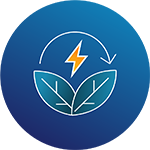
Energy and environmental policy
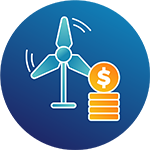
Renewable energy project finance

Systems analysis for sustainable energy

Corporate sustainability
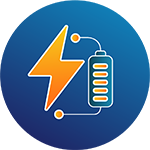
Power generation, transmission, and distribution
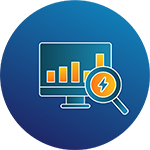
Global energy markets
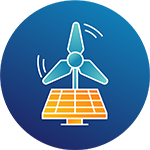
Renewable energy technologies
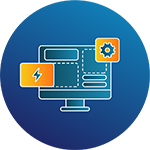
Computer design software

Hybrid and electric vehicles
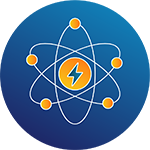
Advanced science and mathematics
Typical Job Functions of a Renewable Energy Professional
Here are some of the interesting things you could be doing.
Preparing financial statements, business activity reports, and forecasts.
Building prototypes, products, and systems for testing.
Supporting or leading teams of engineers, scientists, and technicians.
Conducting research on a wide range of renewable energy-related topics.
Exploring ways to improve the technology of renewable energy systems.
Devising advertising and promotion programs.
Evaluating equipment and processes to ensure compliance with safety and environmental regulations.
Analyzing market trends to maximize profits and find expansion opportunities.
Preparing technical drawings and specifications of electrical systems.
Using computer-assisted design software and performance analysis equipment to improve controls.
There’s an Ocean of Possibilities
The renewable energy industry offers an incredible amount of variety in terms of job types and opportunities. A renewable energy career can be any occupation affected by activities such as conserving energy, developing alternative energy, reducing pollution, or recycling.
Renewable energy jobs and careers can be grouped according to industry sector (solar, wind, etc.), job function (manufacturing, system design, etc.), or profession (scientist, engineer, etc.).
Engineering
- Environmental Engineer
- Industrial Engineer
- Chemical Engineer
- Electrical Engineer
- Mechanical Engineer
- Structural Engineer
- Software Engineer
- Power Systems Engineer
- Aerospace Engineer
- Research Engineer
- Wind Resource Engineer
- Civil Engineer
- Quality Engineer
- Hydraulic Engineer
Science
- Materials Scientist
- Environmental Scientist
- Atmospheric Scientist
- Computational Scientist
- Geologist
- Geochemist
- Geophysicist
- Hydrologist
- Chemists
- Biochemist
- Limnologist
- Oceanographer
- Biologist
- Marine Biologist
Operations and Management
- Environmental Attorney
- Corporate Attorney
- Regulatory Attorney
- Economist
- Regulatory Expert
- Lobbyist
- Site/Plant Manager
- Public Affairs Specialist
- Sustainability Specialist
- Quality Assurance Specialist
- Training and Development Manager
- Logistician
- Wind Resource Analyst
- Power Marketer
Business and Finance
- Finance Manager
- Budget Analyst
- Power Market Analyst
- Financial Analyst
- Portfolio Monitoring Specialist
- Accountant
- Chief Revenue Officer
Start your career search with our extensive list of employment websites.
